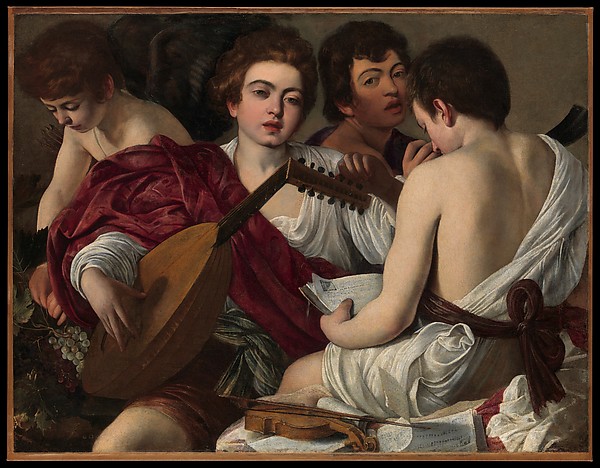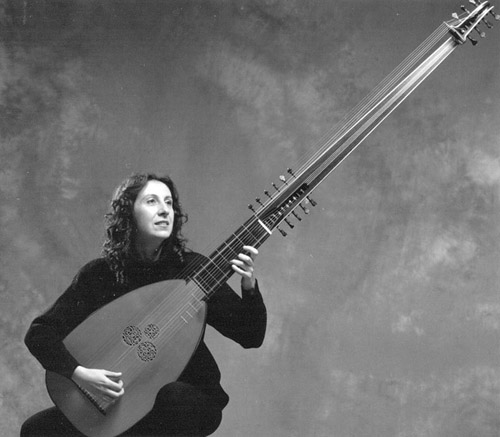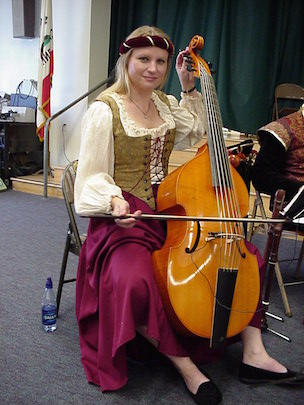

Toccata (1'36) from the opening of Orfeo
performed by London Baroque
 |  |
| A chitarrone | A viola da gamba |
| Dal mio Permesso amato à voi ne vegno, | I come to you from my beloved river Permessus, | |
| incliti Eroi, sangue gentil de regi, | O great heroes, noble race of kings; | |
| di cui narra la Fama eccelsi pregi, | Fame sings your splendid qualities, | |
| nè giunge al ver perch'è tropp'alto il segno. | but falls short of the truth, so high is the mark. | |
| Io la Musica son, ch'à i dolci accenti | I am Music, who with sweet accents | |
| sò far tranquillo ogni turbato core, | can calm every restless heart; | |
| et hor di nobil ira, et hor d'amore | and, now with noble anger, now with love, | |
| posso infiammar le più gelate menti. | can inflame the most frozen minds. | |
| Io sù cetera d'or cantando soglio | Singing to the accompaniment of a golden lyre, | |
| mortal orecchio lusingar talhora | I sometimes tend to entice mortal ears, | |
| e in questa guisa a l'armonia sonora | and thus, with the resounding harmonies | |
| de la lira del ciel più l'alme invoglio. | of heaven's lyre, I inspire the soul. | |
| Quinci à dirvi d'Orfeo desio mi sprona | Now, I am spurred by the wish to tell | |
| d'Orfeo che trasse al suo cantar le fere, | of Orpheus, who drew the wild beasts with his singing | |
| e servo fè l'inferno à sue preghiere, | and made Hell submit to his pleas, | |
| gloria immortal di Pindo e d'Elicona. | to the immortal glory of Pindus and of Helicon. | |
| Hor mentre i canti alterno, hor lieti, hor mesti, | While I sing now of joy, now of sorrow, | |
| non si mova augellin frà queste piante, | let no bird now move among these trees, | |
| nè s'oda in queste rive onda sonante, | nor any wave be heard upon these shores, | |
| et ogni auretta in suo camin s'arresti. | and let every breeze stop in its path. |
Vi ricorda, o boschi ombrosi (2'38) from Act II of Orfeo
performed by Nigel Rogers and London Baroque
| Vi ricorda ò bosch'ombrosi | Do you remember, O shady groves, | |
| De'miei lunghi aspri tormenti, | My long and harsh torments, | |
| Quando i sassi à' miei lamenti | When, at my laments, the rocks | |
| Rispondean fatti pietosi? | Were moved to pity? | |
| Dite: allhor non vi sembrai | Say, did I not seem to you | |
| Più d'ogni altro sconsolato? | More wretched than any other? | |
| Hor fortuna ha stil cangiato | Now fortune has changed her course | |
| Ed hà volti in festa i guai. | And has turned woes into joy. | |
| Vissi già mesto e dolente; | I lived then in sadness and sorrow; | |
| Or gioisco, e quegli affanni | Now I rejoice, and those torments | |
| Che sofferti hò per tant'anni | That I suffered for so long | |
| Fan più caro il ben presente. | Make my present happiness much clearer. | |
| Sol per tè, bella Euridice, | Only for you, fair Euridice, | |
| Benedico il mio tormento; | I bless my torment; | |
| Dopo il duol viè più contento, | After sorrow one is even more content, | |
| Dopo il mal viè più felice. | After woe, one is even happier. |
Tu se' morta (2'43) from Act II of Orfeo
performed by Nigel Rogers and London Baroque
| Tu se' morta, mia vita, ed io respiro? | You are dead, my life, and I still breathe? | |
| Tu se' da me partita | You are gone from me | |
| Per mai più non tornare, ed io rimango? | Never to return, and I should remain? | |
| No, che se i versi alcun cosa ponno, | No, for if verses can do anything, | |
| N'andrò sicuro a' più profondi abissi, | I will go in safety to the deepest abysses, | |
| E, intenerito il cor del Ré de l'ombre, | And having softened the heart of the King of shades, | |
| Meco trarrotti a riveder le stelle: | I will bring you back with me to see the stars again: | |
| O, se ciò negherammi empio destino, | Oh, if wicked destiny refuses this, | |
| Rimarrò teco in compagnia di morte. | I will stay with you, in the company of death. | |
| A dio, terra, à dio Cielo, e Sole à dio. | Farewell earth, farewell Heaven and Sun, farewell. |
Possente spirto (8'49) from Act III of Orfeo
performed by Nigel Rogers and London Baroque
| Possente Spirto, e formidabil Nume, | Powerful Spirit and fear-inspiring God, | |
| Senza cui far passaggio a l'altra riva | Without whom to make passage to the other bank | |
| Alma da corpo sciolta in van presume; | A soul, freed from the body, presumes in vain: | |
| Non viv'io, nò, che poi di vita è priva | I do not live, no; since my dear bride | |
| Mia cara sposa, il cor non è più meco | Was deprived of life, my heart is no longer with me, | |
| E senza cor com' esser può ch'io viva? | And without a heart how can it be that I live? | |
| A lei volt' ho il cammin per l'aer cieco, | For her I have made my way through the blind air, | |
| A l'Inferno non già, ch'ovunque stassi | Not yet to Hades, for wherever there is | |
| Tanta bellezza, il Paradiso ha seco. | Such beauty there is Paradise in her company. | |
| Orfeo son io, che d'Euridice i passi | Orpheus am I, who follows Euridice's steps | |
| Seguo per queste tenebrose arene, | On these dark sands, | |
| Ove giammai per huom mortal non vassi. | Where never mortal man has gone. | |
| O delle luci mie luci serene, | O serene light of my eyes, | |
| S'un vostro sguardo può tornarmi in vita, | If one look of yours can return me to life, | |
| Ahi, chi niega il conforto à le mie pene? | Ah, who denies comfort to my afflictions? | |
| Sol tuo, nobile Dio, puoi darmi aita, | You alone, noble God, can help me, | |
| Nè temer dei, che sopra una aurea cetra | Nor should you fear, since on a golden lyre | |
| Sol di corde soavi armo le dita | My fingers are only armed with sweet strings, | |
| Contra cui rigid' alma in van s'impetra. | Against which the merciless soul tries in vain to resist. |
Lasciate i monti (2'34) from Act I of Orfeo
performed by the Monteverdi Choir and English Baroque
Soloists conducted by John Eliot Gardiner
| Lasciate i monti, | Leave the mountains, | |
| Lasciate i fonti, | Leave the fountains, | |
| Ninfe vezzos'e liete, | Lovely and joyful nymphs. | |
| E in questi prati | And in these meadows | |
| Ai balli usati | To the traditional dances | |
| Vago il bel piè rendete. | Let your fair feet rejoice. | |
| Qui miri il sole | Here the sun beholds | |
| Vostre carole, | Your dancing, | |
| Più vaghe assai di quelle, | More lovely than | |
| Ond'a` la Luna, | When, for the moon | |
| La notte bruna, | In the dark night, | |
| Danzano in ciel le stelle. | The stars themselves dance in heaven. | |
| Lasciate i monti, | Leave the mountains, | |
| Lasciate i fonti, | Leave the fountains, | |
| Ninfe vezzos'e liete, | Lovely and joyful nymphs. | |
| E in questi prati | And in these meadows | |
| Ai balli usati | To the traditional dances | |
| Vago il bel piè rendete. | Let your fair feet rejoice. | |
| Poi di bei fiori | Then with fine flowers | |
| Per voi s'honori | Be ready to honor | |
| Di questi amanti il crine, | These lovers' heads, | |
| Ch'or de i martiri | That after suffering | |
| De i lor desiri | They may happily | |
| Godon beati al fine. | Enjoy their desires at last. |
Sí ch'io vorrei morire (4'07)
performed by Concerto Italiano
| Sí ch'io vorrei morire | Yes, how I wish to die, | |
| Ora ch'io bacio, Amore, | now that I kiss, Love, | |
| La bella bocca del mio amato core. | the beautiful lips of my beloved sweetheart. | |
| Ahi, cara e dolce lingua, | Ah, dear sweet tongue, | |
| Datemi tant'umore | give me such moist kisses | |
| Che di dolcezz'in questo sen m'estingua! | that I perish from sweetness on her breast! | |
| Ahi, vita mia, a questo bianco seno, | Ah, my life, to that white breast | |
| Deh, stringetemi fin ch'io venga meno! | squeeze me until I faint! | |
| Ahi bocca, ahi baci, ahi lingua, torn'a dire: | Ah lips, ah kisses, ah tongue, I say again: | |
| Sí ch'io vorrei morire. | Yes, how I wish to die. |